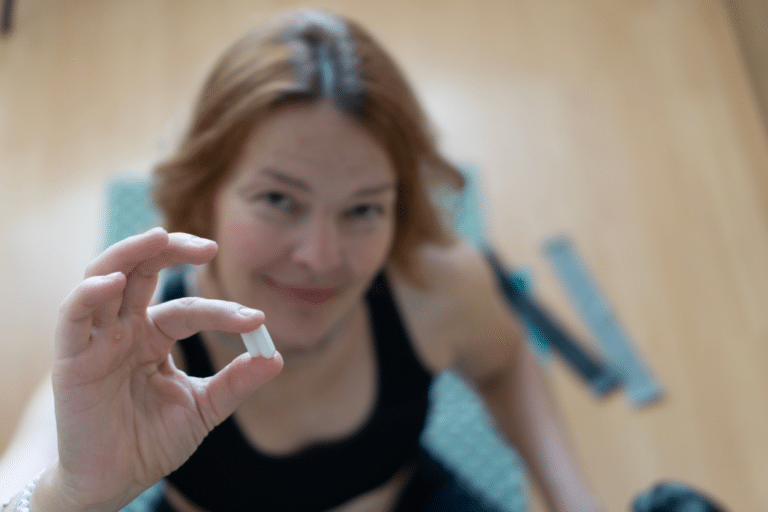When we think about heart disease risk factors, we often focus on cholesterol, blood pressure, and diet. But there’s another major player in the game—one that too many midlife women overlook: chronic stress and poor sleep.
If you’re feeling exhausted, wired but tired, overwhelmed, or struggling to get quality sleep, your heart might be paying the price. The connection between stress, sleep, and cardiovascular health is undeniable, and for women navigating midlife, it’s more important than ever to get these factors under control.
Let’s break down why stress and sleep problems are silent but serious threats to your heart—and, more importantly, what you can do to protect yourself.
How Stress Affects Your Heart
Stress isn’t just an emotional response—it’s a biochemical reaction that can impact your entire body, including your cardiovascular system.
When you’re under chronic stress (hello, midlife juggling act!), your body releases cortisol and adrenaline, which:
- Raise blood pressure – Your heart has to work harder to pump blood through constricted vessels.
- Increase inflammation – Chronic inflammation contributes to plaque buildup in your arteries.
- Lead to insulin resistance – This can increase your risk of diabetes, which is a major heart disease risk factor.
- Encourage weight gain (especially belly fat) – Excess visceral fat is linked to higher heart disease risk.
According to the American Heart Association, women who experience high levels of stress are more likely to develop hypertension, obesity, and metabolic syndrome—all of which raise the risk of heart disease (American Heart Association, 2022).
The worst part? Many midlife women normalize stress and push through without realizing the toll it’s taking on their heart (and the rest of the body…but that’s another blog post).
The Sleep-Heart Connection
If you’re skimping on sleep or tossing and turning at night, your cardiovascular system is suffering more than you might think. Poor sleep—both in quality and quantity—is a major, yet often ignored, risk factor for heart disease.
Sleep and Blood Pressure
A lack of sleep can lead to higher nighttime blood pressure and a reduced ability for the body to regulate blood pressure during the day. Over time, this increases the risk of heart attack and stroke (Goff et al., 2021).
Sleep and Inflammation
Inadequate sleep raises levels of C-reactive protein (CRP), a marker of inflammation that’s linked to cardiovascular disease (Mehra et al., 2022).
Sleep and Metabolism
Poor sleep disrupts blood sugar regulation and appetite hormones, making it harder to maintain a healthy weight and avoid metabolic issues.
Sleep Apnea and Heart Disease
Many midlife women struggle with undiagnosed sleep apnea, which causes drops in oxygen levels and puts enormous stress on the heart. Women with untreated sleep apnea have a much higher risk of hypertension, atrial fibrillation, and heart failure (Franklin & Lindberg, 2015). You can now get at-home sleep apnea tests so if you snore, getting this test needs to rise to the top of the list.
The bottom line?
Skipping sleep isn’t just making you tired—it’s increasing your heart disease risk in ways you can’t afford to ignore.
How to Lower Stress and Improve Sleep for a Healthier Heart
The good news? Managing stress and improving sleep can dramatically reduce your heart disease risk. Here’s how:
Prioritize Deep, Restorative Sleep
- Aim for 7–9 hours of quality sleep per night. I use an Oura ring to track my sleep, and it’s been very eye-opening.
- Keep your bedroom cool, dark, and quiet to support melatonin production.
- Stick to a consistent sleep schedule (yes, even on weekends!).
- Avoid blue light exposure from screens at least an hour before bed. Blue light affects melatonin production.
- If you snore or suspect sleep apnea, get tested—it could be a game changer for your heart health (and energy level).
Regulate Cortisol with Stress-Reducing Habits
- Breathe deeply – Try box breathing (inhale for 4 seconds, hold for 4, exhale for 4, hold for 4).
- Move your body – Gentle walks, yoga, or strength training help lower stress hormones.
- Use adaptogenic herbs – Rhodiola, ashwagandha, and holy basil can support a balanced stress response. BUT don’t take rhodiola too close to bedtime. It can be activating for some people.
- Set boundaries – If work, relationships, or obligations are draining you, it’s time to reassess.
- Try mindfulness or meditation – Just 10 minutes a day can lower cortisol and improve heart rate variability (a marker of heart health).
Cut Back on Stimulants That Wreck Sleep and Raise Stress
- Reduce caffeine intake after noon—it can linger in your system for hours.
- Watch out for alcohol—it may help you fall asleep, but it disrupts deep sleep. I’ve actually had clients who 100% cured their insomnia by cutting alcohol completely.
- Avoid late-night heavy meals, which can spike blood sugar and interfere with sleep cycles.
Support Your Nervous System with Nutrition
- Get enough magnesium (found in leafy greens, nuts, and seeds) to support relaxation. I like magnesium glycinate, taurate or threonate because they all cross into the brain.
- Eat foods rich in omega-3s (like salmon and flaxseeds) to combat inflammation.
- Avoid processed carbs and sugar, which spike blood sugar and trigger stress responses.
Final Thoughts: Protecting Your Heart Starts with Stress & Sleep
If you’re serious about reducing your heart disease risk, don’t just focus on cholesterol and exercise—look at how you’re handling stress and sleep.
A chronically stressed, sleep-deprived body is in a constant state of inflammation and overdrive, setting the stage for serious heart problems down the road.
The best thing you can do? Start small. Prioritize sleep, set boundaries around stress, and make time for daily relaxation. Your heart (and your future self) will thank you.
References
- American Heart Association. (2022). Stress and Heart Health. Retrieved from https://www.heart.org
- Franklin, K. A., & Lindberg, E. (2015). Obstructive sleep apnea is a common disorder in the population—a review on the epidemiology of sleep apnea. Journal of Clinical Sleep Medicine, 11(5), 561-564. https://doi.org/10.5664/jcsm.4738
- Goff, E. A., Kim, K., & Gharavi, R. (2021). Impact of Sleep Deprivation on Cardiovascular Risk Factors: A Review of Current Research. American Journal of Lifestyle Medicine, 15(3), 307-319. https://doi.org/10.1177/1559827620962457
- Mehra, R., et al. (2022). Inflammation and Sleep Disturbance: A Bidirectional Relationship. Current Sleep Medicine Reports, 8(1), 21-34. https://doi.org/10.1007/s40675-022-00200-6
💡 Your Next Step: If stress, sleep struggles, or midlife overwhelm are impacting your health, let’s talk. I help women navigate midlife with science-backed strategies to feel their best.
👉 Book a consultation with me here: www.drannagarrett.com/lets-talk
Dr. Anna Garrett is a menopause expert and Doctor of Pharmacy. She helps women who are struggling with symptoms of perimenopause and menopause find natural hormone balancing solutions so they can rock their mojo through midlife and beyond. Dr. Anna is the author of Perimenopause: The Savvy Sister’s Guide to Hormone Harmony. Order your copy at www.perimenopausebook.com.
Dr. Anna is available for 1-1 consultation. Find out more at www.drannagarrett.com/lets-talk




